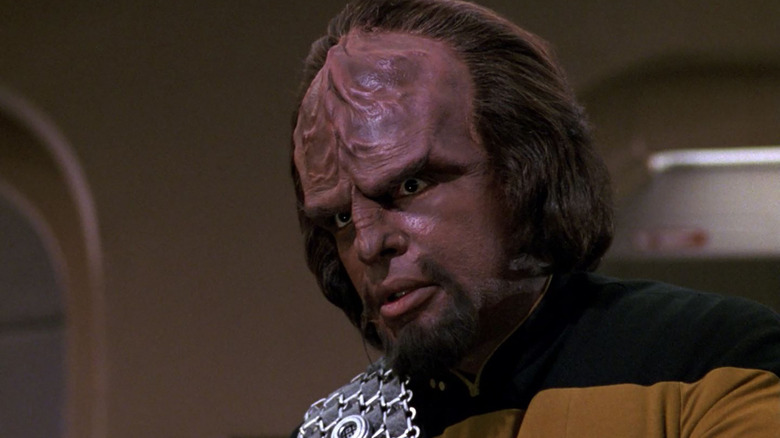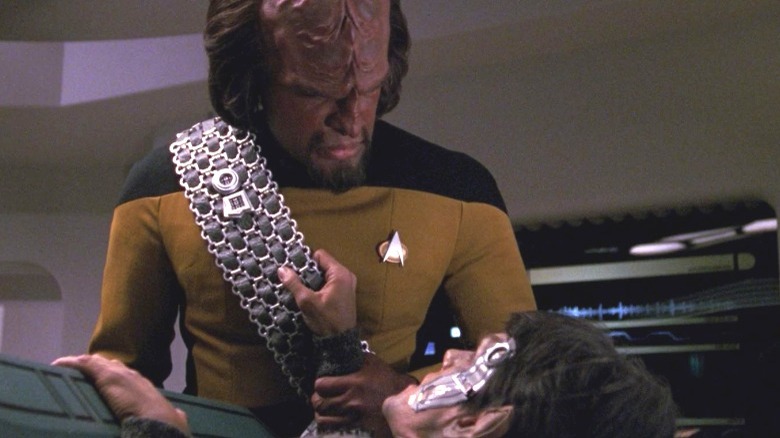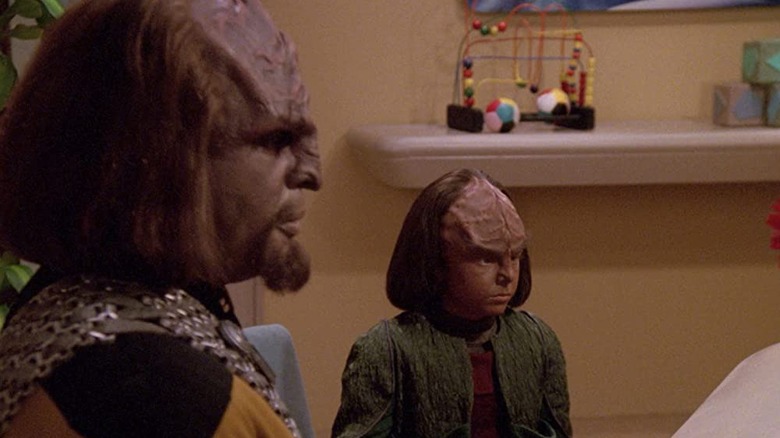Digging Into Worf's Dark Side Was Welcome Challenge For Star Trek's Michael Dorn
Worf is one of the most recognizable faces in all of "Star Trek." Not only does the Klingon warrior and Starfleet officer have a pretty impressive set of forehead ridges, but he's been on more episodes of "Star Trek" than any other character, playing a major role in both "The Next Generation" and "Deep Space Nine." While the character originally started out a little rote, Michael Dorn and the writers of both shows helped mold him into something totally unique. This Klingon raised by humans straddles two worlds, much like Spock did on the original series, though where Vulcans are based in logic, Klingons are based entirely in emotion. Over the course of his arcs on both "TNG" and "DS9," Worf worked through his problems as a father, came to terms with his upbringing, and eventually fell in love and got married to Jadzia Dax (Terry Farrell), the galaxy's coolest Trill.
As he grew more complex, sometimes Worf would find himself in situations where his Klingon heritage would make his decisions hard to understand for humans, including audiences at home. Two episodes in "The Next Generation" in particular left fans feeling disappointed by Worf, who gave in to the darker temptations of a Klingon's bloodthirsty cultural norms instead of the strict codes of Starfleet. For Dorn, however, those episodes were a chance to truly explore the character and tell a different kind of "Star Trek" story.
The challenges of playing a Klingon
Two episodes in particular from "The Next Generation" shocked fans: season 3, episode 7, "The Enemy," in which Worf refuses to give blood to a dying Romulan, and season 4, episode 7, "Reunion," where Worf kills Duras in an act of revenge. In an interview with TrekZone Network, Dorn explained that he too was originally unsure about Worf's unwillingness to help the Romulan:
"At that point Rick Berman was the producer – and as I read I was a little concerned. I was not afraid or anything, I was just concerned that this would cast Worf in a strange light. I like being the outcast, I like being the guy that goes against the grain. But this was way out there and in both cases – in the one where I don't give the Romulan the blood, he said: We just want to show that Worf isn't a human being. He doesn't have to give the Romulan blood. So he's not going to. And he said: if you order me to, I will. But if you don't, I'm not going to. You just have to take that. And I went: okay. It made sense. I didn't know what was going to happen but I think it was a great episode."
While this clear lack of empathy for the dying Romulan is a little hard to swallow, it does help illustrate the differences between Worf and his shipmates. Worf would better learn to balance his learned human behaviors with his instinctual Klingon ones as the series went on, and he became even more empathetic in "Deep Space Nine," but it took time for him to grow.
As far as Duras, though? Dorn figured that while some fans might be surprised, die-hard Klingon fans would appreciate the fact that Worf stayed true to his roots. He's willing to get down and dirty (and bloody), as long as it's within his strict code of honor. Just because that code doesn't line up with ours, as humans in the 21st century, doesn't change who Worf is. Killing is much less frowned upon in Klingon society than in our own, after all.
Dorn was okay with Worf being a bad dad
While Avery Brooks, who played Commander Benjamin Sisko on "Deep Space Nine," thought it was very important that his character's relationship with his son be a positive one, Dorn wasn't as concerned about his portrayal of Worf because he didn't see Worf as a Black character, but a Klingon one:
"... I think that if I was just playing an African-American character, a Black character, and I had a problem with my son I don't think that I would mind if there was a conflict. I mean I had a conflict with my own father. It's just kinda life. I think Avery was correct that you don't see that in general. A lot of it is portrayed that way but I think he's right saying: 'hey I don't think we should do this.' I think definitely right. But for me, no, I would have said: fine."
Worf was great at a lot of things. He was a good security officer, a great warrior, and a good leader. Unfortunately, none of those skills translated to being a good father, because Worf is truly terrible at it. Dorn didn't mind Worf being a bad dad in part because it gave him a bigger acting challenge. Dorn had to figure out how to play a totally clueless dad, and give Worf reasons behind that cluelessness without making him cruel:
"All the physical and running and jumping and killing stuff, that was easy. I love doing that stuff, so that was no big deal. The acting challenge that I adored was the idea that he was really a terrible father. [laughs] He was really bad. Not because he was mean, but he just didn't get it. He just didn't know how to how to make it work. That to me was a great challenge. And luckily, they picked up on all of that and wrote some really fantastic stuff for the character, and on into 'Deep Space Nine.'"
In "Deep Space Nine," Worf gets another chance to bond with Alexander as an adult, and while he still isn't very good at parenting, he at least has some help from Jadzia. Worf's arc is incredible, in part because he's allowed to go to greater depths in many instances than his human crew mates. Dorn understood that complexity, and that's what makes Worf one of the best "Star Trek" characters of all.


